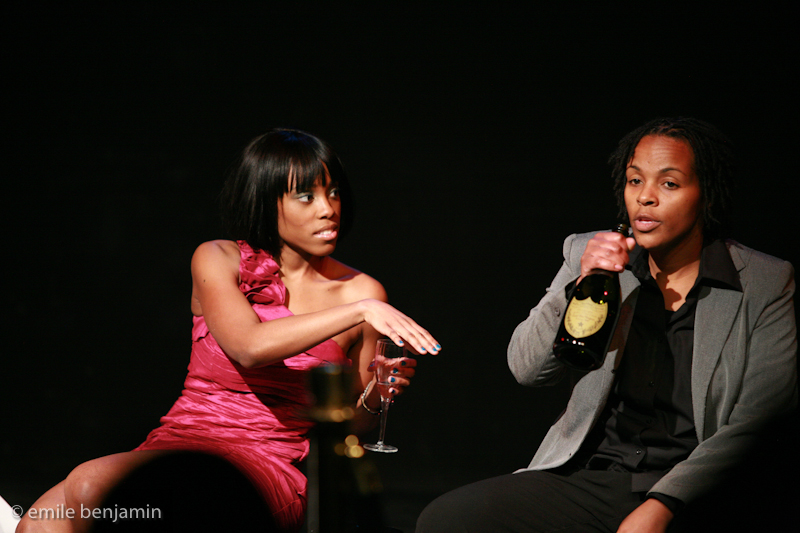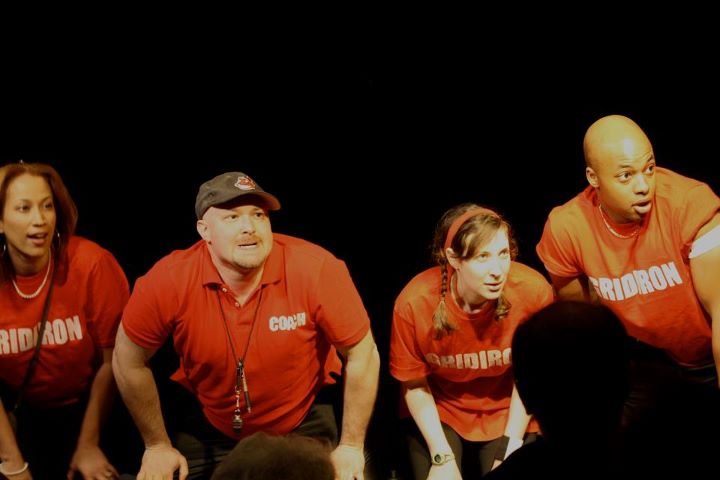|
Jacqueline Lawton: How long have you lived and worked as a playwright in DC? What brought you here? Why have you stayed?
Thembi Duncan: I’ve lived and worked in this area all my life, so it was a foregone conclusion that once I began to transition from actor to playwright that I would remain. Once my daughter leaves for college in a few years, who knows? I can write from anywhere, so I may fly away and move near her dorm. But wait, there’s something quite special about the diverse populace and numerous cultural offerings in the DC area – I never get tired of this place! DC is the “Cheers” to my “Norm.” JL: Have you ever been a member of a DC area playwrights writing group? If so, did you find it useful? Would you recommend that other playwrights join them? TD: I’m a member of the DC-Area Playwrights Group, which is about to post its second season of the Beltway Drama Series at Busboys and Poets in Hyattsville. We don’t write together, but we’ve created another opportunity for local playwrights to see their work. I think that each playwright should give herself the time to develop a clear voice before joining any kind of group. Since theatre is such a collaborative art form, it helps to have a strong sense of one’s own place so that one knows when to bend and when to assert one’s ideas. JL: In DC, we have the Capital Fringe Festival, the Intersections Festival, the Source Theatre Festival, the Kennedy Center's Page-to-Stage Festival, the Black Theater Festival, and the Hip Hop Theatre Festival. We also have the Mead Lab at Flashpoint Theater Lab Program. Have you participated in any of these? If so, can you speak about your experience? TD: I’ve performed in Champagne, a 15-minute piece that I wrote and directed for Monte Wolfe’s Brave Soul Collective, which was produced during the Black Theater Festival. I had reservations about performing in the work, because I really wanted to see it from the audience. After time, though, I came to appreciate the writer/actor/director experience all happening at once in my person. I consider myself a playwright who writes for actors. I write characters that I want actors to be excited about inhabiting. By being inside both those bodies at once, I was able to revise the acting and writing in tandem, which (I think) made the piece better. I’ve also had my short play Gridiron: Adventures from the Sidelines produced twice by Active Cultures for the Sportaculture Play Festival. The second time I saw it was with revisions and with a different cast and director, so it was quite helpful to see how the work played out with different bodies and a different vision. The dramaturgical input from Active Cultures was a big help in my subsequent revision – I heart dramaturgs!! JL: What kind of work do you do to pay the bills? How do you balance this work with your writing? TD: I work as the Lead Teaching Artist and Program Administrator at Ford’s Theatre. This job gives me the occasional opportunity to write dramatic pieces for students, among many other thrilling responsibilities related to the shaping of young people’s minds. My work pleases me, so I don’t often feel that I’m neglecting my writing through my work. Sometimes I have great stretches of time when I could feasibly be writing, but I don’t. I choose to write when the muse hits me, and I refuse to feel guilty for not writing at any given time. [Full disclosure: the latter part of that statement was a recent development. Like last week.] And if I ever get prickly about my quietude, I think of Saul Bellow, who wrote, “...all the while you thought you were going around idle, terribly hard work was taking place... excavation and digging, mining, moling through tunnels...working, working, working, painting, hauling, hoisting. And none of this work is seen from the outside. It's internally done...” JL: How many plays have you had produced in the DC area? Were any of these plays self-produced? If so, where and what did you learn from that experience? TD: The above were the only plays I’ve had produced in the area, and neither of them are full-length, so now I’m ready to take that next step – I suppose when the muse hits again? I’ve had two very well-attended and helpful staged readings of Mon Chaton, a full-length piece set during the Harlem Renaissance, and soon I’ll be ready to do some serious workshopping. Time will tell. Self-production may be the only way this piece gets seen in the area, and I am SUPER okay with that. Teaser: another piece that I’m working on will be mentioned at the end of this interview. JL: If you could be produced at any theatre in DC, which would it be and why? TD: Perhaps the fact that I haven’t given that much thought is directly connected to the fact that I haven’t been produced at any of the major theatres in DC. I honestly don’t know if there’s a theatre whose vision fits my voice – or vice versa, I suppose, since I’m the one who needs the exposure. I would want my work produced at a DC theatre that has a reputation of treating its actors and production staff well. JL: DC audiences are ... TD: ... Underutilized and undercultivated. JL: DC actors, designers and directors are ... TD: ... Courageous, clique-y, passionate. JL: DC critics are ... TD: ... Knowledgeable about theatre history and stagecraft, and I often feel a little more educated after reading the reviews of some of the more experienced and exposed critics, but let’s face it - they have their favorites. Favorite actors, favorite theatres, favorite playwrights. They try to mask it, but it seeps through. Ah, but I love to read reviews, whatever the temperature, if only to get yet another perspective on the work. It takes all kinds! JL: How do you feel the DC theatre community has addressed the issues of race and gender parity ? How has this particular issue impacted you and your ability to get your work produced on the main stages? TD: This community generally has its heart in the right place, but action speaks louder than words. Awareness of race and gender disparities are ever-present in my African-American, female person, so I’m often super-sensitive to what is missing vs. what is being shown to me. I would give main stages in this area a C+ grade for producing work by a variety of genders and ethnicities, mainly because I don’t consider reusing the same “ethnic” playwright season after season very diverse. Now, many of the smaller companies are doing original and lesser-known work driven by the vision of their members (rightfully so), who are often not very diverse ethnically. It’s not something I take personally, nor do I necessarily think it should change. I think there’s room for all of us. Everyone has a right to tell her/his own story, and I don’t want to depend on anyone else to allow me to tell mine. I just have to shove the obstacles aside and find a way to be heard. JL: What advice do you have for an up and coming DC based playwright or a playwright who has just moved to D.C.? TD: Go to as many shows in as many different area theatres as you can in order to get a true sense of what’s being produced here. See what local audiences get excited about, and determine if your work might serve an established audience. No? Then build the audience from scratch. However long that takes. It’s not a race. Ok, that last statement was more to myself. JL: What's next for you as a playwright? Where can we keep up with your work? TD: Right now I’m working on a cross-gender musical satire of Whatever Happened to Baby Jane?, written for the magnificent James Foster Jr. and the phenomenal Michael Sainte-Andress. That will see some staged readings within the next couple of months and will likely be produced within the next year or so, but not necessarily on local stages. I’m on Facebook and Twitter, and one of these days, I just might re-launch my website! Anything’s possible in Duncania (otherwise known as my spotless mind)...
1 Comment
James E. Lawton, Jr
8/26/2012 04:54:12 am
Good interview dear; your subject matter was well chosen and you made excellent use of your Q&A technique. Keep up the good work and remember Who, What Where When and How gets all the answers to the questions ask.
Reply
Your comment will be posted after it is approved.
Leave a Reply. |
My BlogI'm a playwright, dramaturg, and teaching artist. It is here where you'll find my queries and musings on life, theater and the world. My posts advocate for diversity, inclusion, and equity in the American Theatre and updates on my own work. Please enjoy!
Categories
All
Archives
June 2020
Reading List
|



